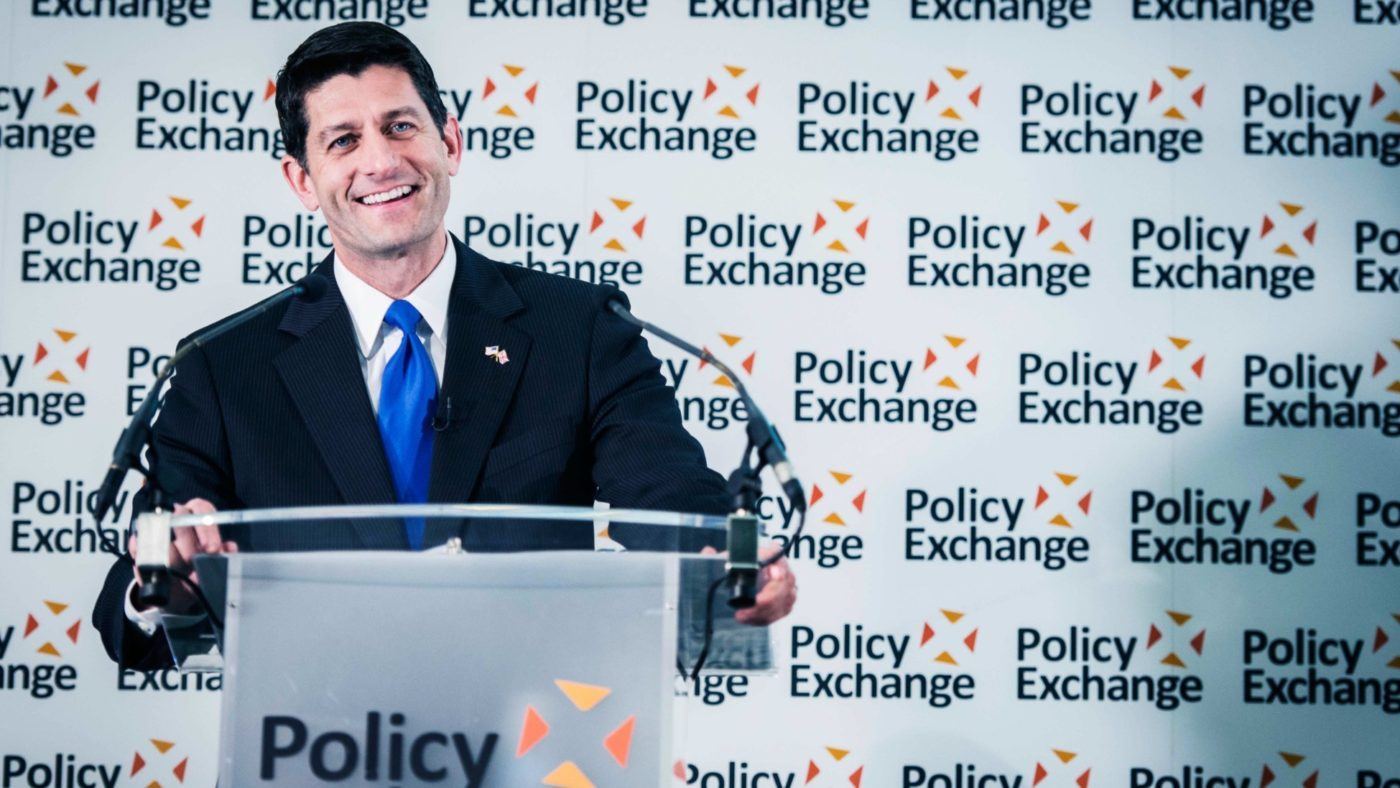There are two things any American leader visiting London must do, Paul Ryan told the audience at Policy Exchange last night: be thankful they don’t have PMQs, and quote Winston Churchill.
I suspect the terror factor for the Speaker of the House – the most powerful Republican in Congress, and arguably, given Donald Trump’s ideological idiosyncrasies, the party’s real leader – would be slightly less if he were facing Jeremy Corbyn at PMQs, as Theresa May is fortunate enough to. But the Churchill quote he deployed was certainly appropriate.
Etched on the bust of Churchill that is now placed inside Congress itself – right where British troops once tried to burn the place down, as Ryan pointed out – are quotes from his address to Congress weeks after Pearl Harbour.
He challenged his audience, said Ryan, to turn “from the convulsions of the moment to the broad spaces of the future”. And we, he argued, need to do the same.
“There may be an instinct to simply stay put, lower our sights, and just confine ourselves to taming all this change. We can cross our fingers, and maybe just aim for good stewardship,” he said.
“Or we can raise our gaze . . . and draw on the characters of our peoples, and the pillars of our societies—freedom, democracy, and enterprise. Because what good is a compass without a course? What good are values without vision? What good are ideas without leaders determined to advance them?”
It was a reminder of something that American politics has and British politics too often lacks: the kind of moral clarity (critics would say naive arrogance) that comes with being the hyperpower. Even though he has recently suffered a sharp political reverse over healthcare reform, Ryan seemed utterly undaunted, denouncing Islamic extremism as a “scourge of evil” and speaking passionately in the Q&A about the need to educate the young about the evils of socialism – he cited Bernie Sanders as an example, but he could have easily used Corbyn.
From a British perspective, Ryan is something of an alien species. He’s the kind of guy you can imagine sitting square-jawed and confident behind the Oval Office desk in a Hollywood movie, not least since his gruelling, 90-minute daily workouts have ensured there is not an ounce of fat under his tailored suits.
Yet he is also a colossal policy geek. He came up, as he pointed out, through the think tank world. And while always in command of his brief, he got practically giddy when given an excuse to describe the technical details of his tax reforms (never has the phrase “destination-based cashflow tax” been deployed so repeatedly or lovingly) or the reasons why Obamacare is failing. The result is a unique combination of jock and nerd: the mind of Ed Balls inside the body of David Beckham.
Inevitably, the headlines were claimed by his firm promise of a UK/US trade deal “as soon as possible” – which must have delighted Liam Fox, who was sitting in the audience. Less widely reported was the fact that he also said that Washington wanted and expected a close UK/EU deal – and would continue to work on its own deal with Europe.
The meat of his talk, however – indeed, the reason he and his congressional colleagues were in the UK at all – concerned Russia.
And here, his language could not have been starker. After thanking the British government for backing Donald Trump’s strikes on Assad, he baldly described Iran and Russia as “complicit” in the Syrian leader’s “crimes against humanity”.
“But that’s not all,” he went on. “Russia is determined to exploit weakness and opportunity wherever it may surface.” He accused Putin of “aggression”, of continuing “to challenge the sovereignty of our allies in Eastern and Central Europe”. Russia “interfered in our elections, and they are interfering in elections here in Europe as we speak”. These, he insisted, “are not the actions of a friend… this is a direct affront to the post-Cold War global order”.
The solution, he said, was “a strong Nato alliance”. “Please let there be no ambiguity here: Nato is essential. It has been and remains critical to the safety and security of the United States, Great Britain, and the world. And it must be strengthened.”
That means all member states following the lead of the US, UK, Poland, Estonia and Greece and contributing two per cent of GDP to defence spending. The “or else” went unspoken, but was heard loud and clear.
Ryan’s visit to Britain, in other words, was not about Britain at all – flattering and reassuring though his admiring remarks were. It was about Europe – hence why his delegation heads now to Poland and Estonia, to deliver the same message.
You could take his speech, with its sharp denunciation of Russia and firm for support for Nato, as a rebuff to his President. But that is not the case.
The Trump administration and the foreign policy elite have had their differences – not least over Russia. But they appear to share a deep and increasing conviction that Europe needs to pay for its own defence, not just because it is unfair for America to bear the load but because there is an enemy that needs to be confronted.
Ryan started his speech by quoting Churchill’s speech in the US in 1941. He could have ended it by quoting his words from 1946:
“Our difficulties and dangers will not be removed by closing our eyes to them. They will not be removed by mere waiting to see what happens; nor will they be removed by a policy of appeasement… From what I have seen of our Russian friends… I am convinced that there is nothing they admire so much as strength, and there is nothing for which they have less respect than for weakness.”


